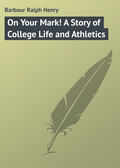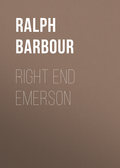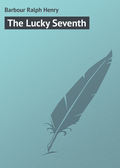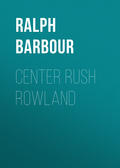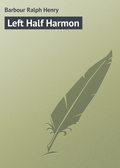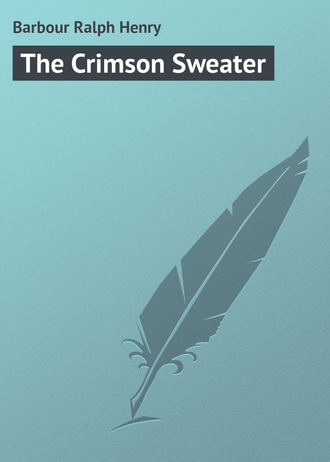
Barbour Ralph Henry
The Crimson Sweater
The rival captain laughed good-naturedly.
"That's right. We've had a dandy time playing you chaps and we'll be ready again next year. Good-bye."
"Good-bye," answered Roy as graciously as he could. "Glad you fellows came over."
He turned and found Jack beside him.
"Say, Jack," he asked, "what's the longest period of time you can think of?"
"I don't know," answered Jack soberly. "What's the answer?"
"One year," was the glum reply.
CHAPTER XVIII
ON FOX ISLAND
Spring came suddenly that year. They woke up one morning to find the river flowing warmly blue and free of ice, the walks running with crystal water and the bricks steaming in the fervid sunshine. Winter had disappeared over night and Spring had come to its own again. With the awakening of the new season came the awakening of new interests. The crew candidates, who for weeks past had been toiling ingloriously at the rowing machines in the basement of the gymnasium, went trooping down the path to the river and launched their shells. The baseball candidates who had been throwing and batting in the cage and sliding to bases over the hard floor trotted out to the field in search of a dry spot whereon to hold their first outdoor practice. With the former went Horace Burlen, free at last, in spite of his enemies' croakings, of all conditions, and Hadden and Gallup and Whitcomb and Otto Ferris and others. With the baseball candidates went Chub, Roy, Bacon, Kirby, Post and many more. And – oh, yes – Sid Welch! Sid had entertained hopes of making the second crew, but such hopes had been sadly shattered. And as Sid had to be trying for something to be content he naturally went in for the only first-class sport left.
"I think," he confided to Chub, "I think I'd like to play shortstop."
"Just as you say, Sid," Chub answered gravely. "All you'll have to do will be to beat Bacon out for the position. You're sure you wouldn't rather pitch? Post and Kirby, you know, aren't so much of a muchness but what you could beat 'em with a little practice."
"Well, anyhow, I don't see why I couldn't be a fielder," answered Sid good-naturedly. "You'll give me a show, won't you, Chub?"
"Course I will, Sid," answered Chub heartily. "You come along out and we'll see what you can do. First of all, though, we'll take a little of that fat off you."
"I've been trying to get rid of it," Sid replied earnestly and sadly, "but it doesn't seem to do any good. I haven't eaten any bread or potato or puddin' for days and days!"
"Never mind the bread and potato, Sid," said Chub with a laugh. "I know a better way."
"What?" asked the other interestedly.
"Chasing flies, my boy!" was the answer.
March was kind to them. It gave them a clear two weeks of fair weather at the end. To be sure, the wind howled dismally sometimes and it was often cold enough to make fingers stiff, but it allowed them to stay out of doors and that was the main thing. April, however, started in meanly. Ten days of drizzle and wet fields affected even Chub's temper. But everything, even a spell of rainy weather, must come to an end some time, and the second week of April brought back sunny skies and mild days. And after that affairs went briskly on the diamond.
Roy had kept his promise to his chum, a promise made on the occasion of their first meeting and re-made several times since. For Chub had got it into his head that Roy had the making of a baseball player and never allowed him to forget for a moment all winter long that he had agreed to try for the team.
"You ought to make a good baseman," Chub said once, looking over his friend with the eye of a connoisseur. "Maybe third – or even first. You've got height and a good long reach; and you're quick and heady. Patten's the only fellow I know of who's after first base. He was substitute last year. He's not bad, but he's not an expert by a long shot. Just you come out, old man, and see what you can do."
And Roy promised for the twentieth time.
Training table was started the middle of April, with Mr. Cobb in command. By that time the candidates had been weeded out until there were but fourteen left. The "culls," as Chub called them, went toward the making up of the second team. There was practice every afternoon save Sunday, usually ending with a short game with the second nine, the latter strengthened by the presence of Mr. Cobb, who played first base or pitched as occasion required. Roy bought a rule-book early in the season and studied it diligently, following it up later with an invaluable blue-covered pamphlet which told him exactly how to play every position on the team. In the end, however, he discovered that the best way to learn baseball is to play it.
Chub started him at left-field and kept him there until he had learned to judge a ball, catch it and field it home. It was hard work, but Roy liked it. Sometimes, however, he doubted whether he would ever vindicate Chub's belief in him. There seemed an awful lot to learn and he envied the ready thought displayed by the fellows who had been playing the game for several years. I think that Chub would have strained a point to keep Roy with him as long as it did not endanger the success of the team, for by this time the two were well-nigh inseparable. But it very soon became evident that no favoritism was necessary; Roy deserved a place on the nine by virtue of his ability. By the middle of April he was having a try at first and two weeks later he had succeeded to the position vice Patten removed to the outfield.
It didn't take him long to accustom himself to the place and its requirements. As Chub had said, he had height and reach, was quick and steady and clear-headed. Of course there was talk; disgruntled fellows who had failed at making the team sneered at Chub's favoritism, and Horace found time from his rowing duties to try and stir up discord amongst the baseball men. But Patten, who had more cause than anyone else to feel dissatisfied, had nothing to say. He had sense enough to realize that Chub had given the position to the best man, and enough of the right sort of spirit to be satisfied, so long as it was for the good of the team and the school. Patten went out to right-field, stifled his disappointment and "played ball."
Chub must have been right. Unless he "has it in him" no boy can learn to play baseball well in three months, as Roy did. Perhaps, though, Mr. Cobb's coaching deserves more credit than I am giving it. He certainly worked hard with Roy. And so did Chub. And the other members of the nine, amongst whom Roy was highly popular, helped, perhaps unconsciously, to give him self-confidence in the early days of his novitiate. So, it seems, the Fates worked together to fashion him into a baseball player much to the regret of Mr. Buckman who had entertained hopes of securing him for the second four. But although Roy liked the water well enough and was never more contented than when out with Chub in the crimson canoe, he was more at home on the turf. Perhaps the first or second four lost a good oar when Roy chose baseball instead of rowing; be that as it may, it is certain the nine found a good first baseman.
April recess began on the twenty-second and lasted nine days, from Friday afternoon to the second Monday morning, although, as the fellows were required to be back at School by Sunday noon, eight days come nearer to the mark than nine. Crew and baseball candidates were supposed to remain at Ferry Hill during this recess and most of them did so. Roy was undecided whether to stay or go home. Chub begged him to remain, putting it to him first on the score of duty to the nine and then citing the camping-out on Fox Island as an inducement. Roy's mother decided the matter for him eventually by writing that she was going South for six weeks. She suggested that Roy join her at a South Carolina winter resort, but Roy had no desire for a week of hotel existence and so threw in his lot with Chub, Gallup, Bacon, Post, Kirby and the others. Jack Rogers went home and so did Sid, who had been working hard on the second nine and showing quite a little promise. Doctor and Mrs. Emery took a week's vacation, but Harry was left behind – greatly to her delight – because her holidays did not come until later. Mr. Cobb, too, disappeared from the scene and the charge of the school was left in Mr. Buckman's hands.
Saturday was the first day of the recess and Roy and Chub spent the morning on the river. They paddled down stream for a mile or more in the canoe and fished, but with scant success. In the afternoon came baseball practice which ended with a six-inning game with a Silver Cove team. Sunday was rather dull for it rained torrents. Chub, Roy, Gallup and Post donned rubber coats or old sweaters in the afternoon and took a long tramp inland. But Monday morning dawned bright and fresh and as soon as breakfast was over the fellows, under Mr. Buckman's direction, began the overhauling of the camping outfit. The four big tents were pulled from their quarters in the boat house, spread out on the landing and gone over for holes or weak places. Then lost pegs were replaced, new guy-ropes supplied and a broken ridge-pole was mended. Dinner was rather a hurried meal that day, for every fellow – and there were twenty-odd left at school – was eager to get into camp. At three o'clock the tents and outfits were loaded into row boats and transferred to the island. All afternoon boats went back and forth on errands; baking powder had been forgotten, Gallup wanted his camera, someone had left one of the hatchets on the landing, cook had neglected to grind the coffee before packing it, four more blankets were needed, Mr. Buckman wanted a roll of adhesive plaster and a bottle of arnica. Meanwhile the tents were erected, the old cook-stove was set up and fuel gathered. At five o'clock, Kirby, under Mr. Buckman's tuition, began the preparation of the first meal. Roy and Chub and half a dozen others built the camp fire in the open space between the tents, piling up the brush and slanting the dead limbs above it until the whole looked like an Indian wigwam. Then came supper; bacon, potatoes, tea, milk and "spider cake," the latter an indigestible but delightful concoction of thin flour batter poured into the frying pan and cooked until nice and soggy.
After supper the camp-fire was lighted, the fellows spread themselves out on the ground about it and the camp went into executive session. Chub was elected Little Chief – Mr. Buckman was Big Chief – and Roy became Medicine Man. Then four Chiefs of Tribe were elected and the honors fell to Roy, Horace Burlen, Kirby and Pryor. These, in turn, selected their warriors and were assigned to tents – or tepees, as they preferred to call them. Roy chose Chub, Gallup, Bacon and Post; Burlen selected Ferris, Hadden, Whitcomb and Walker; Kirby and Pryor made up their households of what material was left, each having five instead of six companions as there were twenty-two boys in the party. Mr. Buckman cast his lot with Burlen's Utes. Roy's tribe was christened Seminole, Kirby's Ojibway and Pryor ruled despotically over the Navajos. Mr. Buckman explained the camp rules. There weren't many of them, but they were strict. The Chiefs of Tribes could grant permission to leave the island but were required to report the names of those leaving to the Big Chief. Every tribe must delegate one of its warriors each day to be fisherman; fishermen must fish not less than two hours and turn their catch over to the Little Chief. Every warrior or Chief must strip his bed before breakfast and hang his blankets in the sun. Each tribe must select a member to be cook and take his turn at preparing the meals; also an assistant whose duty it was to help and wash up the utensils. Prompt attendance at meals was imperative. Offenses would be judged by a council composed of the Big and Little Chiefs, the Medicine Man and the four Tribal Chiefs and punishment would be meted out by them. In the absence of the Big Chief the Little Chief took command; in the absence of both authority was vested in the Medicine Man.
At nine o'clock the fellows sought their quarters and made their beds, for which purpose plenty of pine and hemlock boughs had been cut and piled in the clearing. Each tent was supplied with a lantern which swung from the ridge-pole. A rustic bench held a half-dozen tin wash-basins and a looking-glass was hung from a tree nearby. By half-past nine preparations for the night were complete and the boys gathered again about the dying fire and, kneeling, recited the Lord's Prayer. Then good-nights were said and the Tribes separated. For some time the sound of laughter was heard. Then quiet fell over Fox Island and a big moon, coming up over the tree tops, threw the four tents into dazzling whiteness and paled the glow of the dying embers where the camp fire had been.
CHAPTER XIX
A NIGHT ALARM
Fox Island lay about two hundred yards off shore and perhaps thrice that distance up-stream from the landing. It contained between an acre and a half and two acres, was beautifully wooded, stood well above flood tide and was surrounded on two sides by beaches of clean white sand. Doctor Emery had purchased the island some years before, primarily to keep away undesirable neighbors, and had soon discovered that it was a distinct addition to the school's attractions. The spring camping-out soon became one of the most popular features of the year.
The next morning Chub and Bacon did the honors of the island, conducting Roy from end to end and pointing out the historical spots. He saw Victory Cove, so named because it was the scene of the first struggle between Hammond and Ferry Hill for the possession of the latter's boats, a struggle in which the campers came out victorious. ("The next year," explained Chub, "they got the best of us and swiped four boats and we had to go over and get them back. But that didn't change the name of the cove.") He saw Outer Beach, Gull Point, Hood's Hill, named in honor of a former school leader and Little Chief, The Grapes, a bunch of eight small rocks just off the westerly corner, Treasure Island and Far Island, two low, bush-covered islets of rock and sand lying up-stream from the farther end of the island and divided from it by a few feet of water through which it was possible to wade when the river is not very high, Round Harbor, Turtle Point, Turtle Cove, Round Head, Inner Beach, Mount Emery, a very tiny mountain indeed, and School Point. That completed the circuit of the island. But it took them well over an hour because they took it very slowly and neglected nothing. They took off shoes and stockings and waded to Treasure and Far Islands, they scrambled up Mount Emery, hunted for turtles in Turtle Cove – without even seeing one – and tried broad-jumping on the Inner Beach. It was ten o'clock when they got back to camp and found most of the fellows preparing for a bath. They followed suit and presently were splashing and diving in the water off Inner Beach. It was pretty cold at first, but they soon got used to it. Afterwards they laid in the sun on the white sand until Thurlow thumped on a dish pan with a big spoon and summoned them to dinner. Bathing suits were kept on until it was time to return to the main land for afternoon practice. The island was practically deserted then, for but few of the campers were neither baseball nor crew men.
"Who's going to stay here?" asked Chub before he pushed off the boat. Four boys answered.
"Well, you fellows keep a watch for Hammond. They'll be paddling over here pretty soon, probably to-day or to-morrow, to see where we're keeping the boats. If they come around don't let them see you, but watch what they do."
The quartette promised eagerly to keep a sharp lookout and Chub and Roy dipped their oars and rowed across to the landing.
When they returned at five o'clock the two four-oared crews were just coming back up-stream to the boat-house, looking as though they had been through a hard afternoon's work. Behind them came Mr. Buckman in his scull, his small brown megaphone hanging from his neck. Across the darkening water they could just make out the three Hammond boats floating downstream toward their quarters.
"Who'll win this year?" asked Roy, as they took up the rowing again.
"Hammond, I guess," answered Chub. "They usually do. They did last year. You see they've got almost a hundred fellows to pick from, while we have never had over fifty. That makes a difference."
"Two years ago, though," said Bacon, "they say our crew was thirty seconds faster than theirs. And we were light, too. I don't believe the size of the school has much to do with it."
"Well, it stands to reason that the school that has the most fellows must have the better material," said Chub. "Look at the way it is in baseball."
"That may be," said Bacon, "but a whole lot depends on the spirit of the fellows and the coaching."
"Course it does, but no matter what the spirit is, or how good the coaching may be, four poor oarsmen can't beat four good ones. That's common sense."
"Well, but a good coach like Buckman – " began Bacon.
"Is Burlen a good rower?" interrupted Roy.
"Great," answered Chub.
"Dandy," said Bacon.
"Best we've got," supplemented Post.
"But I don't believe he makes a good captain," said Gallup. "Whitcomb told me the other day that he gets mad as anything when Buckman calls him down."
"It's like him," said Bacon. "He never could stand being told anything. Jack's the only fellow that could ever make him do anything he didn't want to."
"They say Hammond's four this year is the best they've ever had," said Roy.
"They always say that," answered Chub sceptically.
"The first of the season," amended Gallup. "Later they begin to howl about the fellows going stale, breaking their ankles or spraining their wrists. Gee, you'd think to hear them talk a week before the race that they didn't have a man in the boat who wasn't a corpse or a cripple for life!"
"That's so," laughed Bacon, "but you don't want to forget that year before last Williams did the same thing. He gave it out that two of our men had malaria and wouldn't be able to row. They didn't have malaria but they couldn't row much when the time came, so he didn't tell a very big lie."
"That sort of thing makes me tired," said Roy disgustedly. "What's the use in trying to make the other fellow think you're dying. He doesn't believe it, anyway; and even if he does it isn't fair playing."
"That's so," said Chub heartily. "It's babyish."
"Oh, I don't know about that," said Post. "It's part of the game, and – "
"No, it isn't," interrupted Roy. "It has nothing to do with the game. And it's just plain, every-day dishonesty!"
"I don't see how you make that out," objected Post. "Now, supposing – "
But the discussion of ethics was interrupted by the grating of the boat's keel on the sand. Gallup jumped out into six inches of water and pulled the boat up on the beach and the rest scrambled out.
Nothing had been seen of Hammond's spies and so they went to bed without posting guards that night.
"I don't see," observed Roy as he was undressing, "why we don't tie the boats up if we're afraid of having Hammond swipe them."
"Well, it wouldn't be fair, I guess," Chub answered. "You see we've always left them on the beach. If we tied 'em Hammond wouldn't have any show to get them."
"You talk as though you wanted her to get them," said Roy in puzzled tones.
"We do; that is, we want her to try and get them. If we take to tying them to trees and things Hammond will stop coming over and we'll miss more 'n half the fun of the camping. See?"
"You bet!" grunted Post.
"What's to keep her from coming over to-night, then," pursued Roy, "and taking the whole bunch while we're asleep?"
"Because she doesn't know where they are, silly!" replied Chub. "You don't expect those fellows are going to row across here and then go hunting all about the island in the dark, do you? They always come spying around in the daytime first and see where the boats are hauled up."
"It won't be dark to-night," said Roy. "There's a dandy big moon."
"That's so, but Hammond never has tried it without looking about first and I guess she won't this year."
"I wish I was a Hammondite for about three or four hours," said Roy grimly. "I'd open your eyes for you!"
Whereupon he was quickly tried for a traitor and sentenced to be walloped with a belt. The walloping process occupied the succeeding ten minutes and when concluded – not altogether successfully – left the tent looking as though a cyclone had visited it. But Chub's prediction proved correct. The boats were there in the morning, all five of them.
"Those Hammond fellows are a set of chumps," grunted Roy. "Why don't they send you a note and tell you when they're coming? They might as well do that as send fellows over in a boat to rubber around."
"Get out! How are we going to know when they're coming?" asked Chub. "Suppose we see them peeking about to-day; maybe they won't come for three or four nights."
"Then how do they know you won't move the boats in the meantime?"
"Why – why we never do!"
"Oh, I guess I don't know the rules of the game," sighed Roy. "Sounds as though you were all woozy."
It was raining that morning when they arose, but the rain couldn't quench their enjoyment. A shelter tent was put up and they all crowded under it for breakfast. Afterwards the Utes challenged the Seminoles to a game of ring-toss under the trees. Roy was assistant cook that day and so he and Post – Post being chef – were out of it. The Utes won and were much set up about it, issuing challenges indiscriminatingly at dinner. The four fishermen came in just before the meal with a big catch, and Post, who knew less about cooking fish than anything else – and that's saying a good deal – was in despair. After dinner he and Roy took them to the water and cleaned them, but neither thought to remove the scales. The fish were served for supper and there was a popular demand for the speedy lynching of Mr. Post.
"I thought we ought to do something else to them," he explained in extenuation, "but I couldn't think what it was!"
"You want to watch out pretty sharp," said Horace Burlen with deep sarcasm, "or they'll employ you to cook at the Waldorf."
"Fish a la Post," murmured Chub. "Half portion two dollars and a quarter."
"They'd have to pay me more than that before I'd order any," responded Gallup.
"Post and Porter ought to take singing lessons," said Thurlow.
"Why?" asked Hadden unsuspectingly.
"So they won't forget the scales next time," answered Thurlow proudly. He was the recipient of four slices of bread and a portion of a cup of water, all unsolicited and unexpected. Mr. Buckman mildly objected, but appeared to think the punishment deserved.
It had stopped drizzling during the afternoon and practice had been held on a very wet diamond. Chub had sustained a wrenched ankle by slipping while running bases and was inclined to be down on his luck. Roy tried to cheer him up, but had scant success. Chub was convinced this evening that the nine was no good and that certain defeat at the hands of Hammond stared them in the face. Like most normally cheerful persons, Chub was the gloomiest of the gloomy when he decided to be. At camp-fire Thurlow brought out his banjo and got them all to singing. That seemed to raise Chub's spirits some; it did him good, he declared, to howl. Later it started in drizzling again and the campers went to bed early, tying the tent flaps securely ere they retired.
It was black night when Roy awoke. He couldn't even see the canvas overhead. He wondered what had awakened him and listened to the deep breathing about him for a moment. Perhaps Post had talked in his sleep; he often did. Roy turned over again and closed his eyes. Then he opened them quickly. From somewhere came a sound as though a boat was being drawn across the pebbles of a beach. He listened intently, but heard nothing more. He had imagined it, he told himself sleepily. But he wasn't satisfied. After a moment he heard it again, that grating noise. He reached toward Post about to awaken him, thought better of it and scrambled noiselessly out of bed. After all it was hardly probable that Hammond had visited them without giving the usual notice; it wouldn't be playing fair and Chub would be frightfully pained and grieved! Roy smiled to himself as he tried to find the cords which lashed the tent flap close. There was no use in waking the whole crowd up unless there was some reason for it. He would just look around a bit first – if he could ever get out of the fool tent! Then the last cord gave way and he slipped out into the darkness.
The camp-fire was long since out and the shower had drowned even the embers. It was no longer raining, but the ground was wet underfoot and the grass and low growth threw drops against his bare ankles. It was not quite so black outside here as it had been in the tent, and in the east a rift in the clouds hinted of the moon, but it was too dark to see much of anything. Roy felt his way across the clearing, stumbled over a peg as he crept past the Ute quarters and shook a shower of raindrops from a young pine as he went sprawling into the underbrush. It was very damp there on the ground and pine needles and grass and twigs were plastered to his body, but he lay still a moment and listened. Surely, if there was anyone round they couldn't have failed to hear him crash into the bushes! All was still for an instant; then there was a subdued splash as though someone had unintentionally plunged his foot into water. Roy cautiously lifted his head. Now came a whisper; another answered from a distance; an oar creaked in its lock.
Only a fringe of pines and underbrush divided Roy from the Inner Beach which was here some thirty feet wide. As noiselessly as possible he stood up and stared into the darkness ahead. It seemed that he could distinguish forms moving about, but he decided that an excited imagination was to blame. Cautiously he pressed through the bushes, which being wet gave little sound as their branches whipped back. Then he was on the edge of the pebbles. And as he raised his bare foot to step forward again the moon broke forth from the broken clouds and he stopped short, stifling the cry that sprang to his lips. In the sudden flood of dim light the edge of the stream seemed fairly alive with boats, while right in front of him, so near that another step would have reached him, a dark figure was kneeling in his path.



